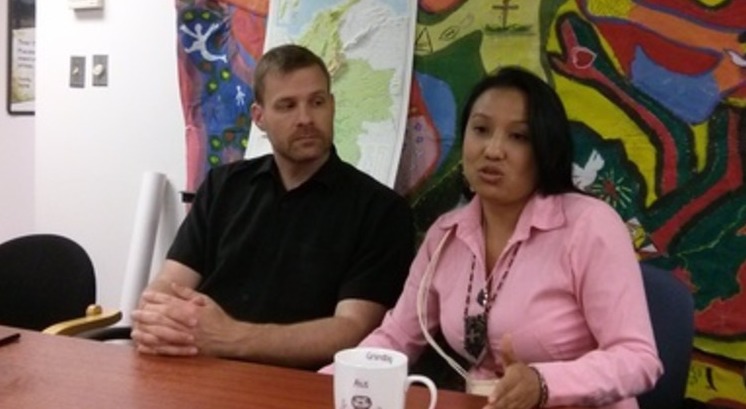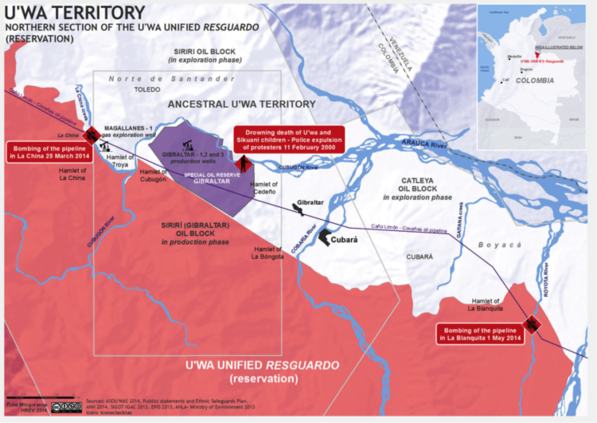Development and Indigenous Rights: ¿Por qué no los Dos?
History is repeating itself for the U’wa people, a peaceful indigenous group from the remote Andean cloud forests of northeastern Colombia. Once 20,000 strong, the U’wa tribe dwindled to 7,000 members during Spain’s period of brutal colonial rule. [1] Nonetheless, they have remarkably survived into the modern era and even maintained their territory. Today, giant oil companies represent a threat similar to the menace once posed by Spanish conquistadors in their ruthless quest for gold. Corporate-friendly Colombian policy, catalyzed by the U.S. Free Trade Agreement, allows national and international oil companies—particularly Colombia’s state-owned Ecopetrol and U.S.-based Occidental Petroleum (Oxy)—to threaten the U’wa’s autonomy by drilling for natural resources in their ancestral territory. [2]
In a presentation hosted by Amazon Watch and EarthRights International (ERI) on May 22 at ERI’s office in Washington, Aura Tegria Cristancho, member of the U’wa tribe and legal advisor of the Association of U’wa Traditional Authorities and Councils, explained the U’wa people’s struggle against extractive industries.
In her presentation, Tegria Cristancho explained how hydrocarbon exploration projects, particularly the Gibraltar oil exploration project of 2007 and the ongoing Magallanes gas exploration project that began in late February, have heightened tensions between the Colombian government and the U’wa people. Both projects threaten the U’wa Unified Resguardo (Reserve) and cause irrevocable social and environmental damage, including internal displacement of the U’wa people and contamination of their land and water. [3]
Accompanying these projects were attacks by paramilitary groups along the Caño Limón pipeline, a 480-mile long crude oil pipeline constructed in 1986. Caño Limón is Colombia’s second largest oil pipeline, responsible for producing approximately one-fifth of the country’s daily oil production. [4] This massive pipeline, transporting oil from the northwest oilfield to the Caribbean port of Coveñas, [5] has sparked 564 attacks by paramilitary groups between 1996 and 2005, as indicated by a United States Government Accountability Office study [6].
Two recent bombing attacks along the pipeline, one on March 25 on the outskirts of the U’wa reservation next to La China Creek and another on May 1 next to the Róyota River on U’wa ancestral territory, have further distressed the U’wa community. [7] The attacks physically harmed several U’wa people, demolished homes, and contaminated the water in creeks and rivers, making it non-potable for the U’wa and adjoining communities. The destruction and instability brought on by resource extraction and armed conflict occurring on their ancestral land is especially devastating to the U’wa people because their beliefs and value system reject any kind of violence and emphasize preserving the value of their Mother Earth, La Pachamama.
One-way Negotiations
In response to the series of insurgent attacks on the Caño Limón pipeline and government-authorized exploration projects, the U’wa have gained national and international attention after peacefully protesting repairs to the pipeline, thereby halting oil production [8] and resulting in a loss of $220 million USD and 67,000 barrels of oil per day [9]. These protests eventually led to an active dialogue between the U’wa community and Bogotá officials in which the U’wa outlined specific demands to the government. Their demands include recognition of their colonial land title, terminating all external interference in U’wa ancestral territory (including all extraction projects and National Parks), securing oversight by government accountability groups, and receiving compensation for damage. [10]
However, the Colombian government seemingly treated the dialogue merely as a bureaucratic hurdle to be overcome. Its minimal concessions were limited to allowing the U’wa to conduct a socio-environmental impact assessment of the Magallanes project during a one-month suspension of the project. [11] In her presentation, Tegria Cristancho explained that the one-month period allowed is not nearly enough time even to recruit lawyers and scholars to undertake such an evaluation, much less carry it out, casting the government’s sincerity in doubt. The dialogue is scheduled to resume at the end of the one-month period on June 1, when a joint commission will also evaluate the U’wa people’s demand to reclaim their colonial land title.
Given the minimal concessions granted, it is evident that the government is steadfast in its decision to ward off any major concessions to the U’wa people, even if it means exploiting the indigenous community, because of the implications it would have for the distribution of land and resources in the country. During her presentation, Tegria Cristancho described other indigenous groups who had accepted government concessions more willingly, hoping to at least achieve greater compensation for an outcome that they saw as inevitable. However, she also recalled her mother describing consultations with the government as a lost cause, in which they only ask you one question: “How do you want to die—by rifle or by knife?”
A Continental Conundrum: An Unsustainable Development Model and a Lack of Political Will
The daunting struggle of the U’wa represents yet another case of a developing nation, in economic partnership with the United States, favoring resource extraction and corporate profit over the well-being of its rural poor. “Land grabbing” has a long and brutal history in Latin America, where elites have been forcing communities off resource-rich land since the arrival of the conquistadors. As COHA has previously written, Peru and Guatemala have also experienced violence and protests due to extractive industries relying upon a host of deceptions in order to occupy indigenous people’s territory. [12] Colombia certainly follows this trend by hosting the world’s largest number of internally displaced people, about 4-5 million, or over ten percent of its population. [13] According to the Colombian National Indigenous Council, nearly all of the country’s indigenous groups have been victims of, or are threatened by, forced displacement. [14] Although the U’wa’s case does not constitute forced displacement, it still falls within the realm of land grabbing, because Oxy and Ecopetrol are indeed coercing the U’wa to surrender their land to be used in a way that conflicts with their spiritual beliefs and value system.
Modern land grabbing in Colombia is driven by the primacy of financial power and the internal armed conflict. While President Juan Manuel Santos’ administration has made positive progress by continuing to engage in peace talks with the FARC (which might end if Oscar Ivan Zuluaga is elected to replace Santos as president in the second round of elections on June 15), Colombia remains firmly entrenched in a misguided neoliberal development model that favors the unequal production of wealth over human rights.
These neoliberal policies of deregulation and openness, as well as tacit acceptance of the use of paramilitaries for corporate land grabbing, have indeed resulted in huge amounts of foreign direct investment. Transnational corporations (TNCs) have flocked en masse to ramp up coal and gold mining, oil extraction, and agribusiness in Colombia. [15] TNCs own rights to millions of hectares of land in Colombia, many of them originally used by local communities for subsistence farming. [16] The United States has supported this process wholeheartedly, establishing a Free Trade Agreement with Colombia that came into effect in 2012. [17]
The Colombian development model (a modern iteration of the Washington Consensus) is certainly effective at producing wealth, and arguably at reducing poverty. According to economic indicators, including average income per capita and income distribution, poverty in Colombia has decreased by two-thirds from 1978-1999. [18] On the other hand, relocating for employment at an oil well only makes money for some Colombians (males with technological and language skills), consequently leaving women and indigenous people out of the development process. Furthermore, another study attributes modern poverty reduction in Latin America to a demographic dividend: a once-in-a-country’s-lifetime phenomenon in which an increase in working-age population and a simultaneous drop in birth rate contribute to an elevated income per capita. [19]
The demographic dividend theory implies that Colombian (and other Latin American) development models may have had little to do with the broad drop in poverty since the 1980s. For Colombia, this suggests that development requires more than parochial economic policies. The case of the U’wa vividly demonstrates the environmental and human costs when a community’s way of life does not align with the Colombian development model. This calls for a serious reevaluation of the neoliberal approach to economic development that considers long-term environmental impacts and addresses the immediate needs of the people.
Please accept this article as a free contribution from COHA, but if re-posting, please afford authorial and institutional attribution. Exclusive rights can be negotiated. For additional news and analysis on Latin America, please go to: LatinNews.com and Rights Action
References
[1] Hightower, Jim. “This Drug War isn’t All About Drugs.” Colombia Journal. http://colombiajournal.org/colombia23.htm.
[2] Issue Brief: Colombia’s U’wa People. Washington, D.C.: Amazon Watch, 2014. U.S. Department of State, U.S. Relations With Colombia. Washington, D.C., 2013. http://www.state.gov/r/pa/ei/bgn/35754.htm
[3] Issue Brief: Colombia’s U’wa People. Washington, D.C.: Amazon Watch, 2014.
[4] United States Government Accountability Office. Security Assistance: Efforts to Secure Colombia’s Caño Limón-Coveñas Oil Pipeline Have Reduced Attacks, but Challenges Remain. Washington, D.C., 2005. http://www.gpo.gov/fdsys/pkg/GAOREPORTS-GAO-05-971/html/GAOREPORTS-GAO-05-971.htm
[5] Ibid.
[6] United States Government Accountability Office. Security Assistance: Efforts to Secure Colombia’s Caño Limón-Coveñas Oil Pipeline Have Reduced Attacks, but Challenges Remain. Washington, D.C., 2005. http://www.gpo.gov/fdsys/pkg/GAOREPORTS-GAO-05-971/html/GAOREPORTS-GAO-05-971.htm
[7] Issue Brief: Colombia’s U’wa People. Washington, D.C.: Amazon Watch, 2014.
[8] Molinski, Dan. “Colombia’s U’wa Indians Continue Oil Protests After Talks Fail.” Wall Street Journal. 25 April 2014. “Indígenas U’wa toman un pozo petrolero en Colombia para presionar diálogo.” Caracol. 29 April 2014. http://www.caracol.com.co/noticias/internacionales/indigenas-uaposwa-toman-un-pozo-petrolero-en-colombia-para-presionar-dialogo/20140429/nota/2200748.aspx
[9] “Reactivado Caño Limón tras dos meses sin operar.” El Tiempo. 26 May 2014. http://www.eltiempo.com/economia/sectores/reactivado-cano-limon-tras-dos-meses-sin-operar/14040196
[10] Issue Brief: Colombia’s U’wa People. Washington, D.C.: Amazon Watch, 2014.
[11] Ibid.
[12] Grody, Arienna and Lincoln Wheeler. “Murder in Peru: Indigenous Rights and Corporate Interests.” Council on Hemispheric Affairs.12 June 2009. https://coha.org/murder-in-peru-indigenous-rights-and-corporate-interests/
[13] Ferris, Elizabeth. “Colombia: Displacement and Peace.” Brookings Institute. 10 June 2013. http://www.brookings.edu/blogs/up-front/posts/2013/06/10-colombia-displacement-farc-ferris
[14] United Nations High Commissioner for Refugees. A Global Humanitarian Organization of Humble Origins. 2014. http://www.unhcr.org/489c1a4b7.html
[15] Glennie, Jonathan. “Land grabs have dominated Colombia’s history.” The Guardian. 31 January 2011. http://www.theguardian.com/global-development/poverty-matters/2011/jan/31/colombia-land-grab-displaced-poor
[16] Richani, Nazih. “Sovereignty For Sale: Corporate Land Grab in Colombia.” North American Congress on Latin America. 10 April 2012. https://nacla.org/blog/2012/4/10/sovereignty-sale-corporate-land-grab-colombia
[17]United States Department of Commerce. “U.S.-Colombia Trade Promotion Agreement.” Washington, D.C.: 2012. http://trade.gov/fta/colombia/
[18] Velez, Carlos et al. “Two decades of economic and social development in urban Colombia: a mixed outcome.” República de Colombia: Departamento Nacional de Planeación. 28 June 2002. https://www.dnp.gov.co/Portals/0/archivos/documentos/DEE/Archivos_Economia/192.PDF
[19] Ros, Jaime. “Poverty reduction in Latin America: the role of demographic, social and economic factors.” Cepal Review. 98: August 2009. http://www.eclac.cl/publicaciones/xml/6/38066/RVI98Ros.pdf



